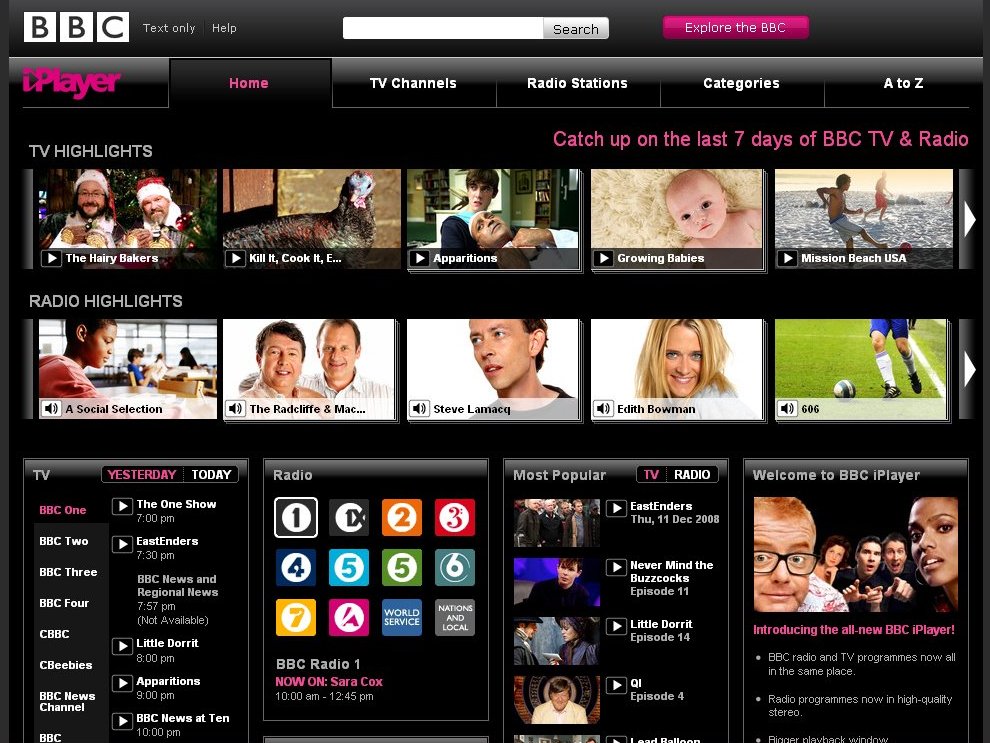7 lessons TV rivals must learn from BBC iPlayer
iPlayer is way out in front. What can its rivals do to 'catch up'?

It's a year since the BBC iPlayer launched its streaming service and went into full soft launch. Its full public launch, on Christmas Day 2007, was a major milestone in what had been a long journey for the online player.
Despite sporadic criticism from ISPs, Linux and Mac users since then, its first year cannot be described as anything less than a resounding success, with an incredible 180 million programmes now viewed.
1. Get with the Flash
After the Beeb was roundly criticised for its Microsoft-dependent download structure, it pulled off a masterstroke in October 2007 by getting in bed with Adobe. It not only brought the iPlayer to Mac and Linux users, but also made the arguments about PC-only downloads look silly. All anybody (OK, most people) wanted to do was stream.
2. Sign the right deals
The first few months of iPlayer were rather barren, with a lack of shows that the BBC hadn't created in house. But now it's a different story. You can watch NBC's Heroes, for example, and it seems that iPlayer rights have now transcended many programme acquisition and commissioning contracts. One area the BBC wants to improve is in Sport. Match of the Day is available to simultaneously stream via the BBC Sport website as the programme goes out, but isn't yet available on iPlayer. However, the BBC did make even the Six Nations Rugby available on iPlayer earlier this year and Wimbledon was also available. We could also see Formula 1 available next season.
3. Provide high quality streams
The BBC continues to roll out new features to iPlayer. You can now join the iPlayer labs which enables you to be able to recommend programming and resize playback windows. But one of the best new features of the last year is the higher quality 800Kbps streams, which debuted in September in addition to the standard 500Kbps streams. There can be problems viewing them on slow connections, but that's not the BBC's fault – the result is very impressive. The standard streams use the On2 VP6 codec (like YouTube), and the audio is encoded as 128Kbps MP3. The higher quality streams use the new MPEG-4 H.264 video codec and the audio is using 96Kbps AAC+.
4. It remembers where you left off
You might be thinking 'this doesn't seem like an amazing feature', but if you are thinking that, you clearly don't watch enough stuff on iPlayer. It remembers if you haven't finished watching something and presents it to you on the homepage. It's the same kind of comfort you used to feel when your much-loved Auntie led you into Woolworths to buy some Pic 'n' Mix.
5. Be robust
iPlayer can occasionally be a little temperamental, especially when a programme is in high demand or you're watching the high quality stream. But very rarely is there a problem that causes you to suspend your viewing for any length of time (though this was more of an issue earlier in the year). iPlayer is now extremely robust – something pretenders to the throne should look to replicate.
Get daily insight, inspiration and deals in your inbox
Sign up for breaking news, reviews, opinion, top tech deals, and more.
6. Make everything available
Also known as 'content, content, content'. With the exception of sports, most areas are now well covered on iPlayer and as a result of signing the right deals and adding in radio, there is now a phenomenal amount of programming available. A scan through last night's TV shows show that everything on BBC One and BBC Two is available with the exception of local news. Impressive.
7. Launch!
Let's be honest, nobody else is anywhere near launching a service as comprehensive as iPlayer. Project Kangaroo has come a cropper courtesy of the Competition Commission and might never see the light of day. Ashley Highfield (the man behind iPlayer) has now left Kangaroo for Microsoft, another blow. 4oD and ITV Player soldier on (the latter with a recent facelift) but each has a long way to go. In many ways development on both has been hit by the lack of progress with Kangaroo, a service that to all intents and purposes, would have superseded them.
-------------------------------------------------------------------------------------------------------
Dan (Twitter, Google+) is TechRadar's Former Deputy Editor and is now in charge at our sister site T3.com. Covering all things computing, internet and mobile he's a seasoned regular at major tech shows such as CES, IFA and Mobile World Congress. Dan has also been a tech expert for many outlets including BBC Radio 4, 5Live and the World Service, The Sun and ITV News.